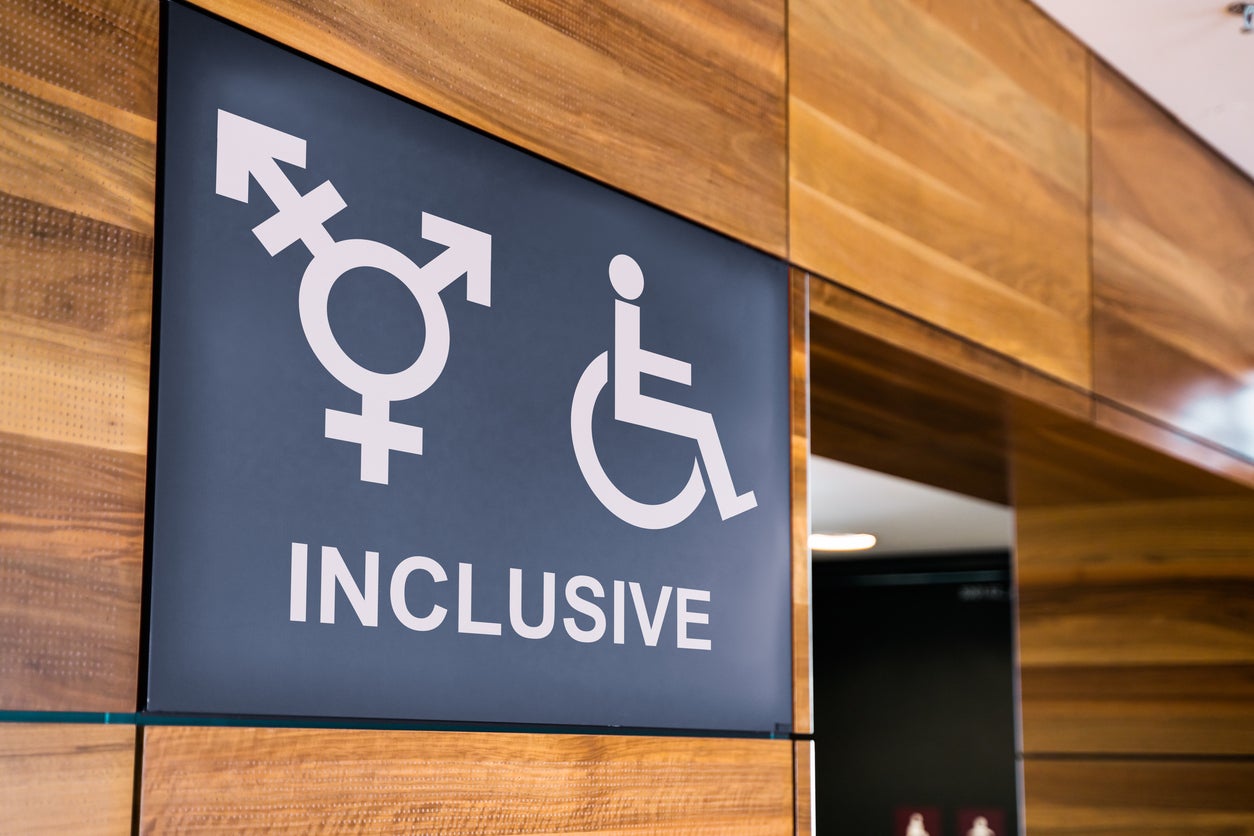I’m non-binary – why does it bother you which toilets I use?
As the government hails new laws over gender-specific bathrooms, Jamie Windust reveals what’s really going on – and why we’ve got our knickers in a twist over where we go for a wee


As a non-binary person, when I wake up in the morning I love nothing more than walking to my own personal bathroom and gleefully pledging my allegiance to gender neutrality.
I have to laugh, don’t you see? How else could I find the humour in the fact that my identity is still so often reduced down to where I decide to deflate my bladder?
Just look at the latest “breaking news” on toilets: the current Tory government has announced a new law mandating that all new non-domestic buildings in England must have single-sex (or “gender specific”) loos.
Women and equalities minister Kemi Badenoch promised the move will end “the rise of so-called ‘gender-neutral’ mixed sex toilet spaces, which deny privacy and dignity to both men and women”.
Wow. Now, first of all: the government’s transparency over its desire to claw back support after a cataclysmic local election defeat is embarrassingly obvious.
But (unlike what many commentators will say) I’m willing to listen to what Badenoch has to say. In fact, as someone whose own “privacy and dignity” is continually undermined – and put out, always, to a form of public, gladiatorial “debate” – I am, nevertheless, always open to hearing and understanding views and opinions that I disagree with, because that’s how the world works.
But to truly understand the issue, first we need to look at what this new law really means.
It’s come into force after being backed by a consultation conducted by the government. We are told that 81 per cent of participants agreed with the proposal for “separate single-sex toilet facilities” in non-domestic settings such as restaurants, shopping centres and offices. That feels pretty clear.
But yhe consultation also claims that 82 per cent of participants agreed with the intention to provide “universal toilets where space allows”.
Sorry... what? Isn’t that what we’ve already got – just rebranded for a conservative audience?
Reading back on the government’s own consultation, it seems to me that a majority of people therefore agree that a non-gendered toilet should be provided, where (and when) space allows. Yet Badenoch seems to have read it wrong: ardently proclaiming that this new law will still “halt the march of gender neutral-toilets”.
To me, despite the spin, it doesn’t appear much will change. Unless there’s something I’m missing?
I decided to find out. After typing the words “trans”, “UK” and “toilets” into Twitter/X, I discovered one reason for this purported change: according to those who identify as “gender critical”, trans people make women feel “unsafe” in public bathrooms – even leaving them with UTIs as a result of them avoiding going to the bathroom at all. These are the defenders of all things “single-sex”. And in their eyes, this legal change will help stop violence towards women.
But as a survivor of rape myself, I am all too aware of predatory behaviour. And it’s overwhelmingly not coming from trans women.
There’s a reason the “women feel safer with bears, not men” debate has taken off on social media. And there’s a reason Elon Musk himself felt he had to step in on X to ask JK Rowling to simmer down.
Violence against women, girls, trans and non-binary people is overwhelmingly a “men” problem – yet the government is consistently directing blame at the “T” in LGBT+. Without remorse, the Tories seem to have chosen a scapegoat for 14 years of failure in addressing the rise of rape and sexual assault (not to mention those who are victims of stalking, murder, misogyny and domestic violence): trans people.
In 2023, 68,327 people reported an instance of rape – yet just 2 per cent of those were convicted. From institutionalised misogyny in our police forces, to the failure to bring to court cases of rape and assault, let alone convict the perpetrators; the system is rigged against victims. That is the real threat. Not trans people in public bathrooms.
By identifying the trans community as a “threat” to women through anti-trans legislation and rhetoric, both the Conservative and Labour Party continue to ignore that we share a common enemy: violence enacted by men who know that they can get away with it, because the cards are stacked in their favour.
If a man wants to commit a violent crime against a woman (or anybody, for that matter), the sign on a bathroom door isn’t going to stop them. You’d expect a women’s and equalities minister to know that.
So, when it comes to this new law – and as certain sections of society mark this down as a win for “dignity and safety”, I question whether it’s truly a step backwards for inclusion (as Badenoch would have us believe), or the opposite. Because trans inclusion still beats trans exclusion – and I’m clinging on to the 82 per cent who said “yes please” to providing “universal toilets where space allows”.
As for right now: I hope the next time you’re leaving the bathroom at the pub and are about to walk back to the questionable second date you’re on, you realise that it really doesn’t matter if you just went to the toilet next to a trans or cis-woman. That they’re not the danger. And all anybody should care about is whether or not you washed your hands.
Jamie Windust is former contributing editor at GAY TIMES and a freelance writer






Join our commenting forum
Join thought-provoking conversations, follow other Independent readers and see their replies
Comments